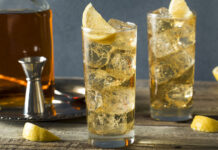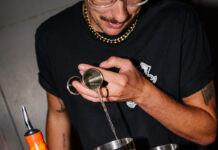Producers say the onus is on operators and staff to be aware of key drinks trends

IN-depth knowledge of products and trends is central to building a robust and successful drinks portfolio.
And firms insist these qualities are just as important for operators choosing the right product range as they are to brand owners.
“Know your customers, monitor what they drink and when,” said Terry Barker, sales and marketing director for Cellar Trends, distributor of brands that include Luxardo, Auchentoshan and Pusser’s Rum.
“Look at your seasonal sales trends, check your pricing versus the competition, be aware of your shelf space capacity and give prominence to fast-moving brands.”
Knowledge of the products is vital, say firms.
“Operators and their staff should be fully aware of the products they stock, in order to maximise sales opportunities with consumers,” said Ron Young of Halewood International, whose brands include Lamb’s Navy Rum and Crabbie’s.
“An operator’s brand portfolio will depend on the style of bar – if it is a top-end, spirit-led establishment, then the operator will need to consider a range of brands in order to develop a strong cocktail offering.
“However, for high-tempo outlets which may appeal more to younger people and students, a mixture of brands and tertiary products, particularly within the vodka category, would be more appropriate.”
Ross Agnew, Scottish brand specialist with Marblehead, said consumer interest in food has expanded into the drinks industry and made customers more knowledgeable of different serves.
“I think with the explosion of cookery programmes over the last ten years this has trickled over into the world of drinks and more and more customers are becoming more aware and knowledgeable about what’s available to them,” said Agnew.
“It’s up to the operator to keep in touch with a rapidly expanding market.
“Marblehead as a company offers extensive staff training on all our spirits and we can discuss what’s available from the competition.”
Marblehead, whose portfolio includes Domaine de Canton, Opihr gin and Glen Moray single malt whisky, also highlighted the importance of working with new premium brands.
“If you set your stall out with a generic list of market leaders then you can quickly fall into the trap of having your prices compared with every other commercial enterprise,” he said.
“Selecting great brands at a reasonable price point gives your bar individual character and an added level of intrigue for your discerning customer.”
It’s up to the operator to keep in touch with a rapidly expanding market.
Having one company supplying a range of drinks has its benefits in reducing administration and overheads, claims Belhaven.
The company believes a greater understanding can be fostered between operators and suppliers providing a portfolio of drinks.
A spokesman for the firm said: “Working with one supplier over a length of time can develop into a real partnership; the supplier side account team can come to understand the operator’s business and recommend appropriate products, get access to training and promotional support and even extend business financing where appropriate.”
Licensees also need to be aware of trends and lesser-known brands when selecting a drinks portfolio.
Drinks firms say it is vital they are aware of changing tastes and different serves in the industry.
Bacardi Brown-Forman Brands, whose spirits include Jack Daniel’s, Finlandia, Bacardi and Bombay Sapphire, said simplicity is key.
A spokesman for the brand’s training team said: “It’s important to understand what your customers are really looking for; there is no benefit to ordering ten new gins simply because they are ‘on trend’.
“The reality is that the product will gather dust on your back-bar either because your customers don’t want to drink it, it’s too expensive, or your bartenders don’t know how to sell it.”
The company suggests drinks can be transformed at little cost to the operator.
The spokesman added: “Mixed drinks are a great way for licensees to increase revenue and can easily be achieved with a few simple changes and minimal cost, making them an increasingly popular choice.
“The BBFB Training Team always advocates starting with simple serves designed to ‘switch a moment’.
“For example, a simple Bacardi and Coke can be transformed into a Bacardi Cuba Libre with a little lime, while a gin and tonic can become a Bombay Sapphire Royale with the addition of cranberry juice and lemonade.”
New drink trends are not exclusive to spirits categories, however.
Belhaven also reports a huge interest in bespoke beers. A spokesman said: “The interest in craft beers is a huge trend and one that the trade has been quick to capitalise on.
“Boutique spirits and cocktails continue to perform very well at the top end of the trade; it has been interesting to watch gin’s renaissance from a category in the doldrums just a few years ago.”



















